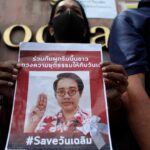Sadiq Khan says the city’s historic memorials should reflect the capital’s values in the 21st century
London’s statues will be reviewed with the aim of removing any which glorify men who profited from slavery, Sadiq Khan has announced following the toppling of Bristol’s controversial memorial to Edward Colston.
The capital’s mayor acted amid growing protests over effigies to slave traders in cities across the UK, including Cardiff, Edinburgh, Glasgow, Oxford and Shrewsbury.
Boris Johnson acknowledged that George Floyd’s death in Minneapolis had awakened an “incontrovertible, undeniable feeling of injustice” among anti-racism campaigners.
But the Prime Minister also urged Black Lives Matter supporters to “work peacefully, lawfully” to defeat prejudice and also warned that those who harm police or property will face the “full force of the law”.
Mr Khan said he did not condone law-breaking, but wanted a proper system put in place for replacing historic symbols which did not reflect the capital’s values.
Street names to be examined
He announced the establishment of the Commission for Diversity in the Public Realm to review London’s landmarks – including murals, street art, street names and statues – in a drive to ensure its memorials better reflect its diversity.
He said he did not want the statute of Sir Winston Churchill in Parliament Square – which was daubed with graffiti calling the Second World War leader a “racist” – to be included.
Mr Khan signalled that he believed that the line should be drawn at memorials celebrating slave traders and plantation owners.

“It is an uncomfortable truth that our nation and city owes a large part of its wealth to its role in the slave trade and while this is reflected in our public realm, the contribution of many of our communities to life in our capital has been wilfully ignored. This cannot continue,” he said.
“We must ensure that we celebrate the achievements and diversity of all in our city, and that we commemorate those who have made London what it is. That includes questioning which legacies are being celebrated.”
Historian and community leaders to advise
The Commission will bring together senior City Hall figures, historians and leaders from the council, arts and community.
Mr Khan told BBC Radio 4’s Today programme: “One of the things that I realise is that I’ve not got ownership of the statutes or indeed some of the land that these statues are on.
“But it is a wider conversation I want to have about the diversity of the public realm in our city.
“When you look at the public realm – street names, street squares, murals – not only are there some of slavers that I think should be taken down, and the commission will advise us on that, but actually we don’t have enough representation of people of colour, black people, women, those from the LGBT community.”
Asked on Sky News about where to draw the line, he said the cases of Churchill, Mahatma Gandhi and Malcolm X showed that many great historical figures were not perfect and history should be taught “warts and all”.




